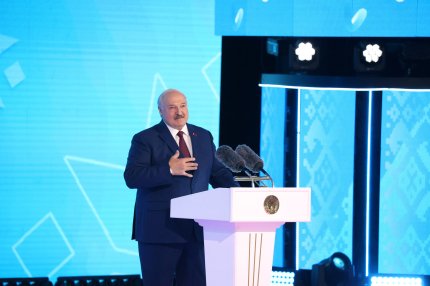The self-proclaimed Belarusian dictator Oleksandr Lukashenko said that he was allegedly being urged to "spit on the Russian Federation" and join Ukraine in the criminal war unleashed by the Kremlin.
Points of attention
- Lukashenko's announcement to side with Ukraine against Russia has sparked controversy and raised concerns about the stability of Belarus.
- The Belarusian dictator's proposal could have significant repercussions on both internal and international fronts, potentially undermining his regime.
- Analysts suggest that Lukashenko's motives for considering joining the war are questionable, and the consequences of such a move remain uncertain.
- The situation on the Belarus-Ukraine border is tense, with Belarusian military activities causing fear among Ukrainian forces and analysts.
- The likelihood of Belarus initiating a war against Ukraine is considered low due to potential risks to Lukashenko's regime, highlighting the complex dynamics at play in the region.
Lukashenko declares attempts to persuade him to switch to the side of Ukraine
We are now being advised, thrown from the side (it all spills out on me): "Let's retreat here, release there." Starting from here and ending with: "Spit on this Russia, and turn your back on this Russia. Let's fight with Ukraine against Russia. And we will bring NATO troops to that border near Smolensk." It comes to that. Today, I am being offered offers from all sides, which we cannot accept for 99% of the time, - the Belarusian dictator declares.

He did not specify from whom these offers come and did not provide any details.
Lukashenko defiantly declared that Belarusians are forced to live in extremely difficult times.
We live in extremely difficult times. I am not talking about the fact that there is a war going on in the south. What are these madmen in the West preparing against us. We must keep this in mind. What do we need in this situation - to turn this country, this little thing (little Belarus - it is not so small when you deal with it in general) from the West to the East. It is necessary to ensure that you are accepted in the East. Thank God, we succeed, but it is hard work, - the Belarusian dictator cynically emphasized.
What is known about the activities of the army of Belarus on the border with Ukraine
According to analysts from the Institute for the Study of War (ISW), self-proclaimed Belarusian dictator Oleksandr Lukashenko, out of fear for his own regime, is unlikely to dare to start a war against Ukraine.
However, the Belarusian army may aim to distract and stretch the Ukrainian military along the border.
The Ministry of Foreign Affairs of Ukraine recently called on Belarus to withdraw its troops from the border and warned that any aggressive and provocative actions will be met with an appropriate response.
In addition, the spokesman of the State Border Guard Service of Ukraine, Andriy Demchenko, said on August 26 that Ukrainian troops are retaliating by strengthening the section of the border with Belarus.
The current build-up of Belarusian forces along the Ukrainian border is likely intended to distract and stretch Ukrainian forces along a wider front line, as ISW estimates that Belarusian forces are still unlikely to invade Ukraine due to the constraints facing the self-proclaimed president of Belarus Alexander Lukashenko. A Belarusian invasion of Ukraine, or even Belarusian military involvement in the war, would impair Lukashenko's ability to defend his regime (and would be highly unpopular domestically), and ISW has previously assessed that Lukashenko is highly unlikely to risk a war with Ukraine that could either weaken his regime or dramatically strengthen it internal Belarusian discontent, analysts emphasize.
Analysts add that Belarus' presidential election is due to be held in February 2025, and Lukashenko is likely to want to maintain control over public sentiment as well as influence over his military to quell any election-related protests, as he did at the end of 2020.




